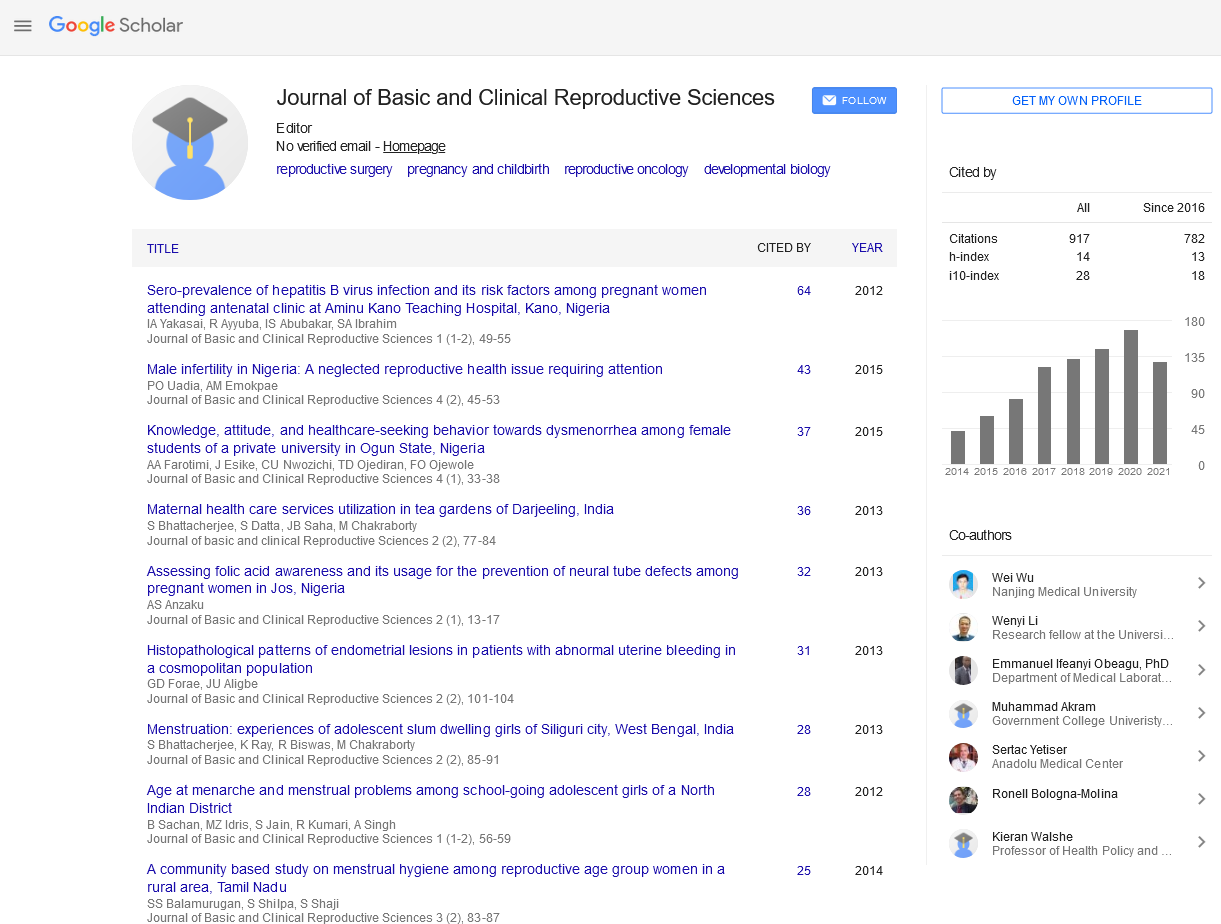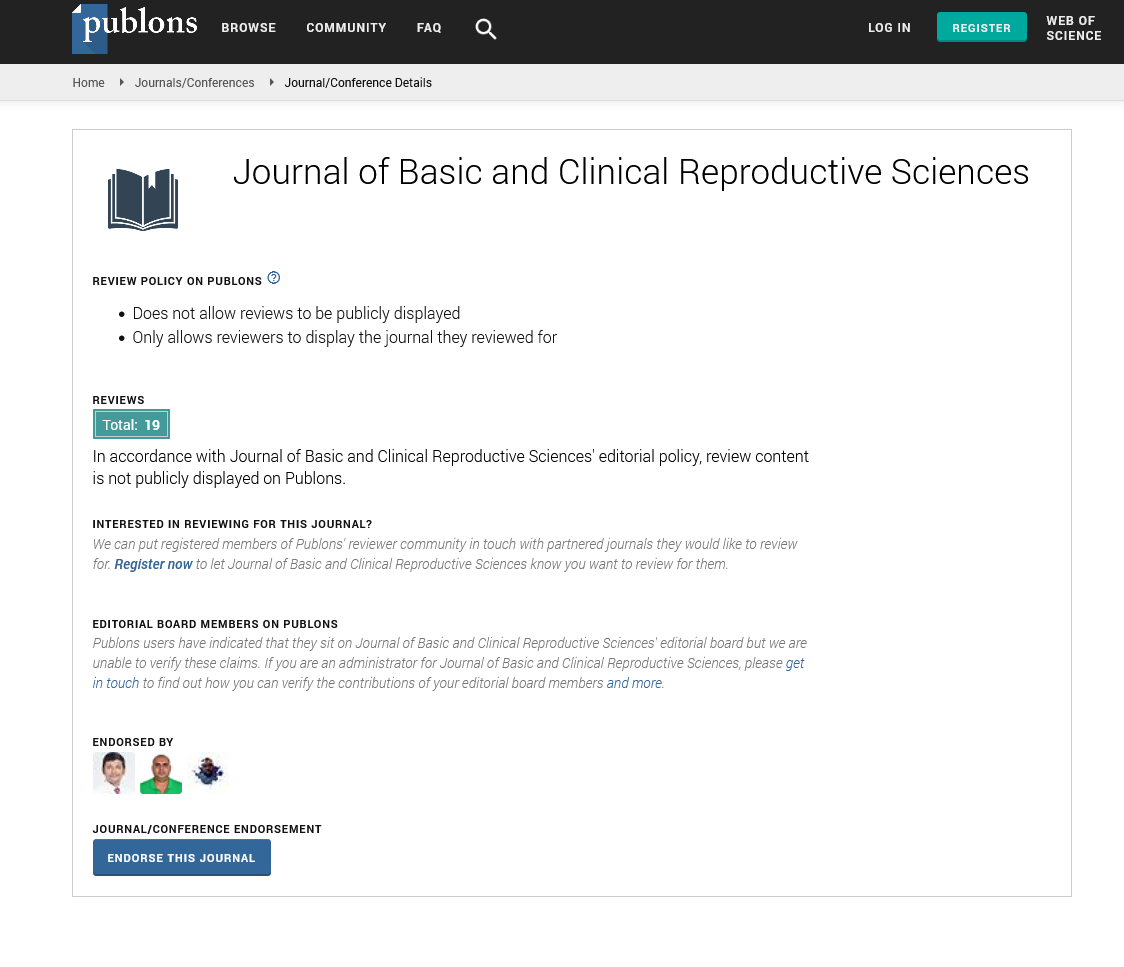Opinion - Journal of Basic and Clinical Reproductive Sciences (2023) Volume 12, Issue 2
Prostate Endocrinology: Unraveling the Hormonal Regulation of Prostate Health
Received: 29-Mar-2023, Manuscript No. JBCRS-23-99701; Editor assigned: 31-Mar-2023, Pre QC No. JBCRS-23-99701 (PQ); Reviewed: 14-Apr-2023 QC No. JBCRS-23-99701; Revised: 21-Apr-2023, Manuscript No. JBCRS-23-99701 (R); Published: 28-Apr-2023
This open-access article is distributed under the terms of the Creative Commons Attribution Non-Commercial License (CC BY-NC) (http://creativecommons.org/licenses/by-nc/4.0/), which permits reuse, distribution and reproduction of the article, provided that the original work is properly cited and the reuse is restricted to noncommercial purposes. For commercial reuse, contact reprints@pulsus.com
Description
The prostate gland plays a vital role in male reproductive health, and its proper functioning is intricately regulated by a complex interplay of endocrine factors. This manuscript aims to provide an overview of the fundamental aspects of prostate endocrinology, focusing on the hormonal regulation that influences prostate development, growth, and function. Understanding the intricate mechanisms involved in prostate endocrinology is crucial for elucidating the pathogenesis of prostate disorders and developing targeted therapeutic strategies. This manuscript reviews the hormonal influences on the prostate, including androgens, estrogens, growth factors, and cytokines, and highlights their significance in maintaining prostate health.
The prostate gland, a small walnut-shaped organ, is a crucial component of the male reproductive system. It is responsible for producing and secreting various substances that aid in sperm viability and function. The intricate regulation of prostate physiology is primarily governed by endocrine factors, which include sex hormones, growth factors, and cytokines. This manuscript aims to shed light on the essential role of hormones in prostate health and explore the mechanisms through which they influence prostate development, growth, and function.
During embryonic development, androgens, particularly dihydrotestosterone (DHT), are pivotal for the growth and differentiation of the prostate gland. Androgen receptor (AR) signaling is essential for prostate epithelial cell proliferation and differentiation. Perturbations in androgen signaling can lead to developmental abnormalities, such as hypospadias and cryptorchidism, highlighting the critical role of androgens in prostate development.
Throughout adulthood, androgens continue to play a significant role in maintaining prostate function and growth. Testosterone, synthesized primarily by the Leydig cells in the testes, is converted to the more potent androgen DHT within the prostate by the enzyme 5α-reductase. DHT binds to ARs in the stromal and epithelial cells of the prostate, promoting cellular proliferation and survival. Dysregulation of androgen signaling, such as in the case of androgen receptor overexpression or mutations, can contribute to the development of prostate cancer and benign prostatic hyperplasia.
Estrogens, traditionally associated with female reproductive health, also play a significant role in prostate physiology. The enzyme aromatase converts testosterone to estradiol within the prostate tissue. Estrogens exert both proliferative and inhibitory effects on the prostate, depending on the specific estrogen receptor subtype and the local hormonal environment. Imbalances in estrogen levels or disrupted estrogen receptor signaling have been implicated in prostate pathologies.
In addition to sex hormones, growth factors and cytokines are crucial modulators of prostate homeostasis. Insulin-like growth factor 1 (IGF-1), transforming growth factor-beta (TGF-β), and Epidermal Growth Factor (EGF) are among the growth factors that regulate prostate cell proliferation, apoptosis, and differentiation. Cytokines, such as interleukins and tumor necrosis factor- alpha (TNF-α), also participate in prostate inflammation and contribute to the pathogenesis of prostatitis and prostate cancer.
Prostate endocrinology is a complex and dynamic field that involves the interplay of various hormonal factors, growth factors, and cytokines. The intricate regulation of these endocrine factors is essential for maintaining prostate health throughout life. Dysfunction or imbalances in hormone signaling pathways can lead to the development of prostate disorders, including prostate cancer, benign prostatic hyperplasia, and prostatitis. Further research is needed to fully unravel the complexities.


